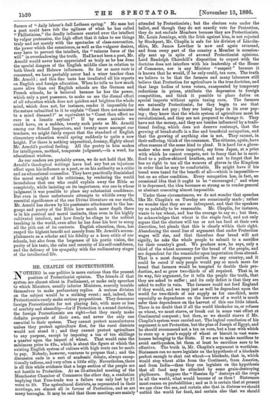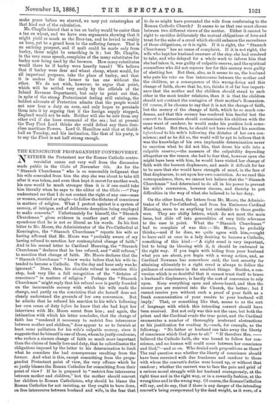MR. CHAPLIN ON PROTECTIONISM.
•
NOTHING in our politics is more curious than the present position of Protectionist opinion. The friends of that system are almost silent in Parliament, or make only speeches to which Ministers, usually inferior Ministers, scarcely trouble themselves to make perfunctory replies. A serious division on the subject would be a striking event ; and, indeed, the Protectionists rarely make serious propositions. They denounce foreign Protectionists for not playing fair, with more or less of acerbity and absurdity—for if Protection is a sound doctrine, the foreign Protectionists are right—but they rarely make definite proposals of their own, and never the only one essential to their system. They cannot protect manufactures unless they protect agriculture first, for the rural districts would not stand it ; and they cannot protect agriculture to any purpose, except by imposing a tax of ten shillings a quarter upon the import of wheat. That would raise the minimum price to 42s., which is about the figure at which the existing English system of culture with high rents can be made to pay. Nobody, however, ventures to propose that ; and the discussion ends in a sort of academic debate, always excep- tionally tedious, and very often a little silly. Nevertheless, there is all this while evidence that a large section of the people are not hostile to Protection. At an ill-attended meeting of the Manchester Chamber of Commerce the other day, a resolution implying that Free-trade was a failure was only lost by 21 votes to 20. The agricultural districts, as represented in their meetings, are almost all in favour of Protection, and so are many boroughs. It may be said that those meetings are mainly
attended by Protectionists ; but the electors vote under the ballot, and though they do not exactly vote for Protection, they do not exclude Members because they are Protectionists.
Mr. Louis Jennings, with the Irish against him, is not rejected by Stockport, Mr. Chaplin is safe for his division of Lincoln- shire, Mr. James Lowther is now and again returned, and from every part of the country a Member is occasion- ally sent up in spite of avowed Protectionist opinions. Lord Randolph Churchill's disposition to coquet with the doctrine does not interfere with his leadership of the House of Commons, nor is any Minister " suspect " because it is known that he would, if he only could, tax corn. The truth we believe to be that the farmers and many labourers still believe that Protection for agriculture is the true doctrine, and that large bodies of town voters, exasperated by temporary reductions in prices, attribute the depression to foreign competition, and think it possible to place duties on special imports without again taxing corn. The farmers are naturally Protectionist, for they begin to see that wheat does not pay ; they are losing hope in its ever pay- ing; they know that the whole system of agriculture must be revolutionised, and they are not prepared to change it. They have not the money, and they are besides influenced by a tradi- tional feeling, which does not deserve contempt, that the growing of bread-stuffs is a fine and beneficial occupation, and that the growing of anything else is not. They cannot, in their suffering, think of the consumer. The citizens, again, have often reasons of the same kind to plead. It is hard for a glove- maker who sees gloves imported, say from Japan, at a price with which he cannot compete, not to fancy that he is sacri- ficed to a yellow-skinned heathen, and not to forget that he has no right to tax all the wearers of gloves in the Kingdom in order that he may be comfortable. He might have if his bread were taxed for the benefit of all—which is impossible— but on no other condition. Every occupation has, in fact, an occasional idea that it ought to be "encouraged ;" and when it is depressed, the idea becomes so strong as to render general or abstract reasoning almost impossible.
Under these circumstances, we do not wonder that speeches like Mr. Chaplin's on Tuesday are occasionally made ; rather we wonder that they are so infrequent, and that the speakers try so painfully to be reasonable. Mr. Chaplin, for instance, wants to tax wheat, and has the courage to say so ; but then, he acknowledges that wheat is the staple food, and not only argues that the electors will tax or not tax food at their own discretion, but pleads that this is clearly within their right. Abandoning the usual line of argument that under Protection wages will rise, and that therefore dear bread will not signify, he asks the whole people to submit to a sacrifice for their country's good. We produce now, he says, only a third of the wheat necessary for the bread of the people, and are dependent for the remainder upon importation from abroad. That is a most dangerous position for any country, and it could be cured if only people would pay so much more for bread that farmers would be tempted to double their pro- duction, and so grow two-thirds of all required. That is, in its way, fair argument, for it tells the people the truth, that they are asked to suffer ; and its only defect is that they are asked to suffer in vain. The farmers could not feed England if they would, and we may just as well be dependent upon the world for two-thirds of our supply as for one-third, more especially as dependence on the harvests of a world is much safer than dependence on the harvest of this one little island. There is no doubt that if all the world blockades us, or refuses us wheat, we must starve, or break out in some vast effort at Continental conquest ; but then, so we should starve if Mr. Chaplin's system were carried out. The logical conclusion of his argument is not Protection, but the plan of Joseph of Egypt, and he should recommend not a tax on corn, but a loan with which to store up a year's supply of wheat or biscuit in vast ware- houses belonging to the State. If we are to make sacrifices to avoid earthquakes, let them at least be sacrifices sure to be effective. The truth is, Mr. Chaplin's argument is worthless. Statesmen can no more legislate on the hypothesis of a blockade perfect enough to shut out wheat—a blockade, that is, which would stop wheat alike from the Continent, from America, and from India—than they can legislate on the hypothesis that all food may be attacked by some grain-destroying phylloxera. Suppose the "Hessian fly" destroys all the crops in all the world, what would become of us then ? Statesmen must reason on probabilities ; and as it is certain that at present we can clear the sea, and certain also that in distress we should outbid the world for food, awl certain also that we should make peace before we starved, we may put catastrophes of that kind out of the calculation.
Mr. Chaplin hinted that a tax on barley would be easier than a tax on wheat, and we have seen arguments showing that it might yield as much as the Beer-tax, and be levied in reality on beer, yet be a grand boon to the suffering farmer. That is an enticing prospect, and if malt could be made only from barley, there might be something in it ; but Mr. Chaplin, in the very same speech, complains of the many substitutes for barley now being used by the brewers. How many substitutes would there be if barley were heavily taxed ? We believe that if barley were dear and wheat cheap, wheat would, for all important purposes, take the place of barley, and that it is useless for the farmer to tax one without the other. We do not wish, however, to argue that point, which will be settled very easily by the officials of the Inland Revenue Department, but only to point out that, in spite of the strong Protectionist feeling still existing, the boldest advocate of Protection admits that the people would not now bear a duty on corn, and only hopes to persuade them into it by arguing that if the foreign supply stopped, England would not be safe. Neither will she be safe from any other evil if she loses command of the sea ; but at present the Tory First Lord thinks she could defeat any three first- class maritime Powers. Lord G. Hamilton said that at Guild- hall on Tuesday, and his inclination, like that of his party, is to say the Fleet is not half strong enough.



































 Previous page
Previous page